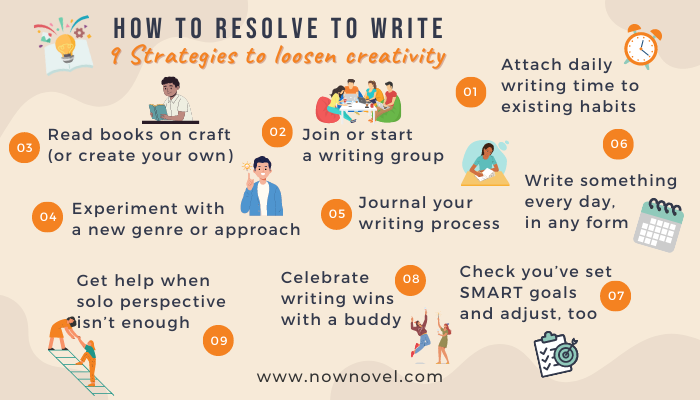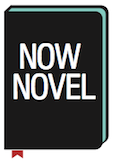Planning a mammoth creative feat such as writing a book is helpful for staying on track and being able to measure your progress. But planning and sticking to the small steps that will carry you to "the end" is easier said than done.
We often say large goals such as this take “discipline” and “motivation.” But what do authors and behavioral scientists say? What are practical ways you can keep making small wins well into the year? Keep reading to find out
- Why Make Writing Resolutions for the New Year?
- Set Resolutions that are Realistic and Attainable
- “Stack” Habits to Make Writing Second Nature
- Join or Found a Writing Group
- Read Books on Craft
- Explore a New Genre or Approach
- Keep a Journal of Your Writing Process
- Write Down Something Every Day in Any Form
- Check You’ve Set SMART Goals and Adjust
- Celebrate Writing Wins with a Buddy
- Get Help When Your Own Perspective Isn’t Enough
Why Make Writing Resolutions for the New Year?
According to Forbes, we’re more likely to stick to goals we write down. Before we can stick to goals, though, we need to loosen a few things (fun fact: ‘resolution’ comes from the Latin ‘resolvō’, or ‘I loosen’). We need to shake loose things such as:
- Ingrained progress-obstructing habits (e.g. procrastination, second-guessing what you’ve written)
- Non-innovative ways of doing things that might not get us the results we want (for example, if you always start drafting Chapter 1 with zero pre-writing and find that you are stuck by the time you reach Chapter 3).
What could you be doing differently?
It’s an odd paradox that creative freedom often requires some fixed parameters. Reining in the scope of a story idea, for example, how genre, scenario, and other elements limit the infinite possibility that could otherwise prove overwhelming, can help achieve your writing goals.
Here are other strategies for loosening creative freedom so you can resolve to write:
- Attach daily writing time to existing habits
- Join or start a writing group
- Read books on craft
- Experiment with a new genre or approach
- Journal your writing process
- Write something every day, in any form
- Check you’ve set SMART goals and adjust as needed
- Celebrate writing wins with a buddy
- Get help when solo perspective isn’t enough

Set Resolutions that are Realistic and Attainable
These are two elements of SMART goals—keep reading for more on the other three.
Resolving to write 80,000 words in a single month may be foolhardy. Five hundred words per day? Doable. This could amount to 15,000 in a month and a full draft within six months
What can you realistically achieve today? You could:
- Write a logline or single-sentence summary expressing your idea for a story scenario. Print or write it out and stick it somewhere it will remind you of your aspirations.
- Outline a character or two you plan to include in your project. Who are they and what are their goals, motivations, and the potential conflicts that could arise in their pursuit of what they want?
- Outline a scene or chapter—what will happen, where, and why
“Stack” Habits to Make Writing Second Nature
All those things you do by default, whether checking your social feed or scrolling through Netflix—each of these are an opportunity to attach writing to something you do by default.
Behavioral scientist BJ Fogg calls this idea “habit-stacking.” He uses the example of saying, “Before I go to bed, I will floss one tooth.” Big goals have inertia, and starting with something small and attainable may mean you’re flossing every tooth in a matter of days.
Say, “Before I do X, I will write for fifteen minutes without stopping to edit.”
Join or Found a Writing Group
Writing groups, when constructive and supportive, provide a great way to motivate yourself and stay accountable to your writing goals. Now Novel found that in our six-month Group Coaching workshop, members would regularly mention the online writing sprints they attended as a helpful factor in finishing.
Meeting with other writers regularly to check in and then write in silence for a fixed time also makes writing a less lonely, isolating process. A drop-in group provides flexibility—it’s there when you need it, but also not a shackle.
Read Books on Craft
Two in three writers we poll on Now Novel report they can always learn more about writing craft. And it’s true—there are so many perspectives, and so many gems of wisdom out there, that reading writing manuals and doing creativity-boosting exercises provides a wonderful way to find new ideas and stay excited to tell stories.
Read manuals such as the drier, style-focused ones (such as The Elements of Style by Strunk & White) as well as manuals by authors themselves. Ursula K. Le Guin’s Steering the Craft is one example that is packed with exercises on point of view, showing, and more.
To keep yourself inspired, keep a journal of lines you read in books that you love. It’s a great way to build a compendium you can dip into for inspiration and re-energizing in your writing adventures.
Explore a New Genre or Approach
One reason many writers lose steam is that writing the same old story that has proven frustrating or difficult to get past a certain point becomes chore-like. Resolve to shake things up this year if you get stuck at any point.
You might try your hand at a different genre, or try a new approach such as writing the last chapter first—whatever shakes you out of the habitual to build a more creative path to the finish line.
Keep a Journal of Your Writing Process
The writing process itself is full of ups and downs, moments of elation and despondency. This is true for beginning and seasoned authors alike.
Journaling the process is useful as a kind of self-reporting. Reading back, you can see what gave you grief and what was a joyful discovery. This kind of history of yourself is a valuable asset to practicing writing with more intention.
Intention is the ally of focus (and thus of progress and sticking to resolutions).
Write Down Something Every Day in Any Form
George Bernard Shaw said we don’t so much “find” ourselves as “create” ourselves.
Often writers will say, “I can’t find time,” as an excuse when doubts creep in. Not having time is a valid reason for not being able to produce more, of course.
Yet you can write down something every day, in any form (even in a bullet list while sitting on the bus). Save every scrap in a drawer—you never know when it could be the seed of your magnum opus.
Check You’ve Set SMART Goals and Adjust
We mentioned above that goals that nurture unbreakable resolutions are realistic and attainable. They’re grounded in what you can, within reason, achieve. That covers the R and A in ‘SMART’ goals. There’s no “story making” without S, M, and T, though—specific, measurable, and time-based.
A goal such as, “I will write 500 words every day before I watch my new favorite TV show after work this week,” is SMART. It is specific (how much and when), measurable (you have a word count target you can check your progress against), attainable, realistic, and time-based.
Remember to adjust your goals if you’re struggling to keep to them, though. Knowing when to take breaks and what you can comfortably achieve in a writing session comes with practice.

Celebrate Writing Wins with a Buddy
All the progress you make this year as you keep to your writing resolutions is worth celebrating. When you hit a milestone (such as writing your first chapter, then your second, third), pause to reward yourself. It could be a cup of tea, a walk somewhere beautiful, or some other sign you give yourself to acknowledge you’re putting in the work.
These small celebrations reinforce our commitment to a task, and create the dopamine hits that make good habits addictive. When you have a writing buddy in a group, congratulate and champion each other towards the finish line.
Get Help When Your Own Perspective Isn’t Enough
In all the creative arts, from writing to TV, film and more, it takes a village. If writing solo works for you, keep on. If you find during 2023 that you’re struggling with your perspective on your creative work, connecting with writing coaches is a great way to bounce ideas and maintain a sense of purpose about what you’re doing.
A Now Novel coach described what she does as being a “pep-talk-cheerleader meets your own pet editor.” Having guidance from an author who’s been through the writing process many times will help you maintain a sense of what you’re doing, why you’re doing it, and learn how to do it better.
How are you planning to keep to your writing targets this year? Let us know down below.

